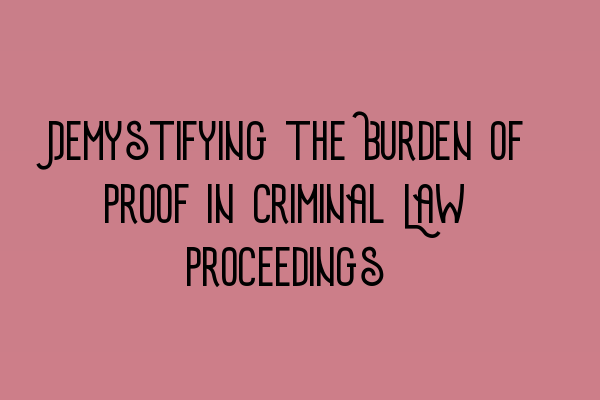Demystifying the Burden of Proof in Criminal Law Proceedings
When it comes to criminal law proceedings, one crucial aspect that often remains misunderstood is the burden of proof. Understanding the burden of proof is essential for both legal professionals and individuals involved in criminal cases. Let’s delve deeper into this concept to demystify its importance and implications.
What is the Burden of Proof?
The burden of proof refers to the obligation placed on the prosecution to establish the guilt of the accused in a criminal trial. In other words, the prosecution must prove beyond a reasonable doubt that the defendant committed the alleged crime. This high standard protects the rights of the accused and ensures that no one is wrongfully convicted.
The Standard of Proof: Beyond Reasonable Doubt
Beyond reasonable doubt is the standard of proof required in criminal law proceedings. It is the highest standard of proof and requires the jury or judge to have no reasonable doubt about the guilt of the accused based on the evidence presented.
Understanding this standard is crucial as it sets a high bar for the prosecution. It means that if there is any reasonable doubt about the defendant’s guilt, they must be acquitted. Reasonable doubt does not mean absolute certainty, but rather a doubt that is based on reason and common sense.
The Role of the Prosecution
The burden of proof rests solely on the prosecution in a criminal trial. It is their responsibility to present compelling evidence and convincing arguments to prove the guilt of the accused. The prosecution must establish each element of the alleged crime beyond a reasonable doubt.
To do so, the prosecution may present witness testimonies, physical evidence, expert opinions, and any other relevant evidence. The strength and persuasiveness of the prosecution’s case determine the likelihood of a conviction.
The Role of the Defense
The defense in a criminal trial does not bear any burden of proof. The accused is presumed innocent until proven guilty, and it is the prosecution’s responsibility to overcome this presumption by establishing guilt beyond a reasonable doubt.
The defense’s role is to challenge the prosecution’s case and present evidence or arguments that create doubts about the defendant’s guilt. This may involve cross-examining witnesses, presenting alibi evidence, challenging the credibility of the prosecution’s witnesses, or introducing alternative theories of the crime.
Implications of the Burden of Proof
The burden of proof has significant implications in criminal law proceedings. It ensures that the accused receives fair treatment, protects against wrongful convictions, and upholds the principle of “innocent until proven guilty.”
By setting a high standard of proof, the burden of proof safeguards against the risk of convicting innocent individuals. It places the responsibility on the prosecution to present strong and compelling evidence to establish guilt beyond a reasonable doubt.
Conclusion
Demystifying the burden of proof in criminal law proceedings is essential for legal professionals, individuals facing criminal charges, and anyone interested in the criminal justice system. Understanding the burden of proof helps ensure fair trials, protect the rights of the accused, and maintain public trust in the criminal justice system.
To learn more about criminal law and prepare for the SQE exams, we recommend exploring the following related articles:
- SQE 1 Practice Exam Questions
- SQE 1 Practice Mocks FLK1 FLK2
- SQE 2 Preparation Courses
- SQE 1 Preparation Courses
- SRA SQE Exam Dates
